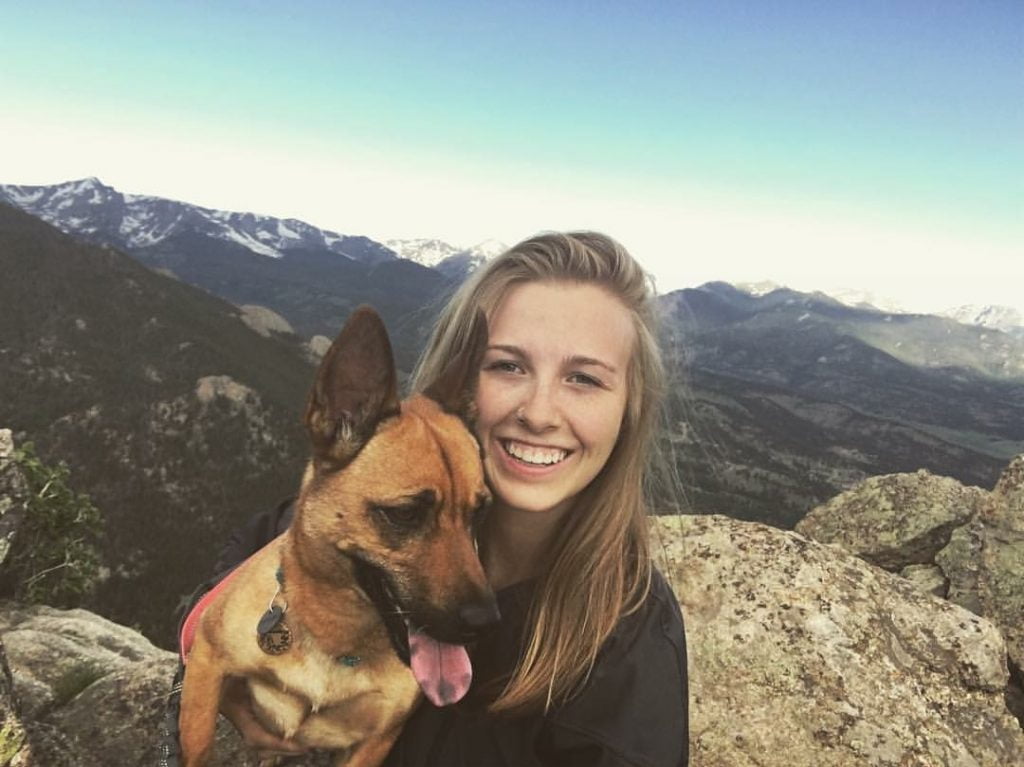Katharine “Kate” Taylor ’18 developed a passion for the environment growing up in Colorado’s San Luis Valley, a harsh yet beautiful landscape of mountains, sand dunes, desert plains and hot springs. At the same time, she was transfixed by the stories of her ancestors, especially the 19th century women who tamed the land and built farms in southern Illinois.
“My life has been shaped by the women in it. I also grew up in an area of the country where people are deeply connected to the landscape. But the connection between women and nature really didn’t become clear until I was at Hastings College,” said Taylor, who is now a master’s student and teaching assistant at the University of Colorado Boulder’s highly-regarded Department of English. “I knew I was interested in women writers and fascinated by the ‘uncivilized wilderness’ trope in literature. But it took some time to find the intersection between the two.”

Taylor, who graduated from Hastings in 2018 with majors in English and psychology, plans to pursue her doctorate in literature after completing her master’s degree this May. Her ultimate goal is to become a college literature professor, a career path inspired, in part, by Dr. Patricia Oman, associate professor of English and director of the Hastings College Press.
“Dr. Oman was the most influential in my academic career,” Taylor said. “She’s the reason I thought about graduate school. She was the first person to ask me if I was going to think about it, and she is the reason I found my passion in the field. Working with her on restoring lost texts and especially female writers changed my life direction.”
In fact, Taylor’s master’s thesis will be based on a book she read in one of Dr. Oman’s classes. Sanora Babb’s “Whose Names Are Unknown” is a Dust Bowl-era novel left unpublished for six decades because John Steinbeck’s “The Grapes of Wrath” hit the shelves first. For Taylor, Babb’s long-ignored book about farmers fleeing Oklahoma raises important questions about borders, both natural and man-made.
“Who is allowed to be published? Who is encouraged to publish this type of writing? I’m suggesting that the borders of publication do not reflect the borders of land in terms of the women who worked and lived there,” she said.
Taylor’s work on women writers is not going unnoticed. This month, she’ll speak on Babb and borderlands at the Western Literature Association conference in Estes Park, Colorado. In November, she’ll discuss writer Judy Blume and singer Janis Joplin at “The (re)Making of a Movement: New Perspectives of the 1960’s Counterculture,” a conference in Toronto, Canada.
An academic life
Growing up in Alamosa, Colorado, Taylor found a second home on the campus of Adams State University, where her father, Dr. John Taylor, a theatre professor, allowed her to spend time after school and even cast her in productions.
“We lived really close to the campus, so if I wasn’t hanging out with my dad in his office, I was running rampant on the grounds,” she said. “I also played children’s parts in several of my dad’s shows, like Emmy in ‘A Doll’s House’ and Tiny Tim in ‘A Christmas Carol.’”
After enrolling at Hastings College, she found a new group of role models in the Department of English.
“Seeing the work that the professors at Hastings do and the genuine connections they make with their students really inspired me. How many places do you go where you get to have dinner at your professor’s house? Look through their book collections?” she said. “The professors also prepared me for graduate school because they encouraged me to do my own research and develop my own ideas. That’s exactly what graduate school is about.”
Last semester at CU Boulder, Taylor taught “Introduction to Literary Theory,” a course required of all English majors. This semester, she is a teaching assistant for an upper-division class on science fiction.
“Getting up in front of a classroom is really empowering,” she said. “There is just this awesome feeling about being able to share my expertise and passion for a topic. I even helped a couple of students working on their honors theses. That isn’t something TA’s normally do, but our interests aligned.”
An environment nurtured and shaped by women
Her senior year at Hastings College, Taylor was one of six students selected for Irish Fellows, a competitive program blending on-campus courses with a month of independent study in County Clare, Ireland. She focused on Lady Augusta Gregory, an Irish dramatist and literary patron who lived at Coole Park, a gathering place and inspiration for writers like Yeats and Shaw. Taylor presented “Lady Gregory and Nature” at the 2018 Academic Showcase, the annual celebration of students’ original research.
“I’m really interested in American women writers. For Irish Fellows, I researched an Irish writer. It was the research process that I loved,” she said. “It can be frustrating when you get only a limited response to your emails, phone calls and visits. But there’s one moment or discovery that makes it completely worth it.”
As she researches doctoral programs in English, Taylor finds herself “bouncing back and forth a bit” on possible dissertation topics. But this scholar of women writers and lover of nature finds herself drawn, time and time again, to a familiar subject.
“The thing that keeps coming to mind is researching the women who shaped the lands we love and cherish in the U.S. Most people don’t realize that several of our national parks became national parks because groups of women came together to petition for them,” she said. “I want to look at letters, journals, articles and unpublished works to curate and frame a narrative of the women who shaped conservation in the U.S.”

